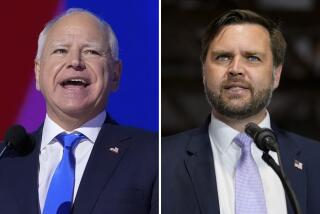The Debates Are Coming: Voters’ Nap Can Stop Now
- Share via
Bob Dole has been telling audiences for weeks that he’s at such a disadvantage as a debater he deserves to be declared the winner simply for showing up for Sunday’s encounter with President Clinton. Self-deprecating humor, to be sure, but also perhaps a sign of the pessimism now hanging over Dole’s campaign.
With a month to go until election day, Dole is still struggling to nail down even 40% support in the opinion polls. The two scheduled television debates--one Sunday, the second on Oct. 16--might provide a needed boost for the underdog, as the debates in 1960 and 1980 did for John F. Kennedy and Ronald Reagan. Or they could simply serve to solidify Clinton’s lead. A lot depends on whether anyone other than committed partisans will even be watching. And here the signs aren’t encouraging. The Pew Research Center says its survey finds that fewer voters than in the past plan to tune in.
One reason could be the absence of Ross Perot, whose popularity is down sharply since 1992 but whose presence might have added a certain entertainment value to the proceedings. A second reason is what might be called, indelicately but not inaccurately, the boredom factor: Like most, this campaign has gone on a long, long time, what with pre-primary politicking, the primaries, the conventions and now weeks of repetitive speechmaking. Most voters probably feel that by now, when it comes to the nuts and bolts of a candidate’s pitch, they’ve pretty much heard it all.
For better or worse, the debates from their modern origin in 1960 have tended to be more theatrical than informative, more a matter of trying to shape impressions than of delving into substance, evaluated more on the basis of how a candidate delivered his lines than on the cogency of his arguments. To say that, though, is simply to describe what politics at almost any level has become. Don’t, for example, look for a serious discussion about what has to be done to change Social Security and Medicare to keep them economically viable. Barely a word has been spoken about either key domestic problem in this campaign, and few are likely to be heard as the campaign drifts toward an end.
Should the two presidential debates, and one vice presidential debate, be ignored, then? Not at all. However frustrating in their lack of depth they might be, they remain a part of the democratic process, a 90-minute showcase that’s at least an improvement on the vapid 30-second sound bites the news broadcasts usually give us by way of political coverage. Our advice is to tune in (Sunday at 6 p.m. Pacific time), pay attention and maybe find a moment to regret that what we’re watching falls so far short of a real debate. Then find a moment to remember it still beats what most of the rest of the world has to offer.
More to Read
Get the L.A. Times Politics newsletter
Deeply reported insights into legislation, politics and policy from Sacramento, Washington and beyond. In your inbox twice per week.
You may occasionally receive promotional content from the Los Angeles Times.










